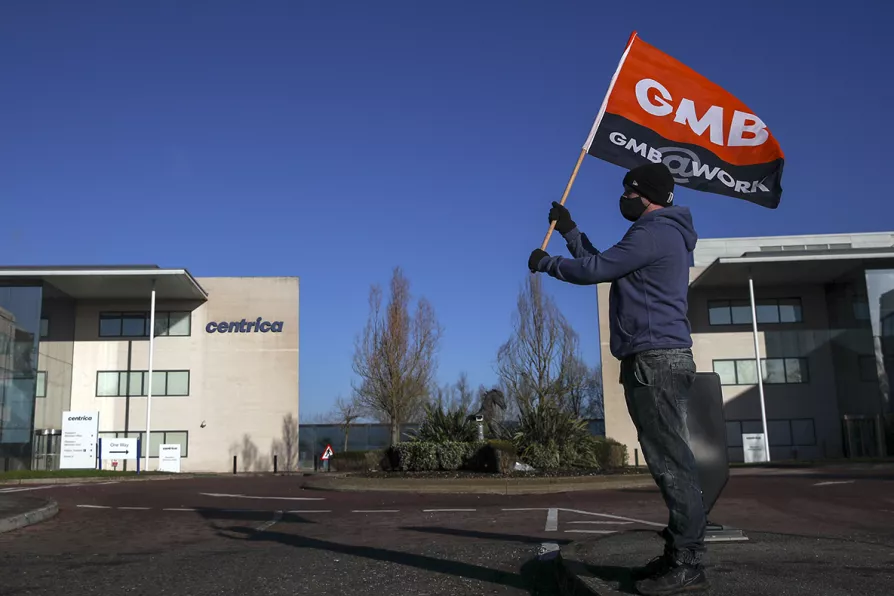
 A British Gas worker outside the headquarters of Centrica in Windsor, Berkshire, on the first of a seven-day strike over new contracts in January 2021
A British Gas worker outside the headquarters of Centrica in Windsor, Berkshire, on the first of a seven-day strike over new contracts in January 2021
RECORD profits for British Gas owner Centrica and TUC analysis showing NHS workers have lost more than a year’s pay since 2010 are two sides of the same coin.
British Gas’s riches are squeezed from human misery: this is the same firm whose bosses have been summoned to Downing Street for sending debt collectors to break into vulnerable people’s homes and install extortionate pre-payment meters.
Its profits have risen more than threefold in a single year. That no longer surprises. Like BP and Shell, it is raking in the fruits of energy prices which have soared because of the Russian invasion of Ukraine and the retaliatory sanctions imposed by the West.
But blaming global circumstances like the war is to miss the point. If the disruption it had caused had made extraction and supply more expensive for oil and gas firms, who were simply passing on price rises, we would not see this leap in profits.
This is price-gouging: prices being ratcheted up by a cartel of energy monopolies who control the market and can charge what they want.
Inflation is a class question. It is enriching the few as quickly as it is impoverishing the many.
That’s how it is connected to the TUC’s findings on plummeting NHS real-terms pay — findings which we know reflect the picture across the workforce.
The cumulative effect of the Conservatives’ decision to hold down public-sector pay has cost NHS workers the equivalent of between 13 and 14 months’ wages over 13 years. In effect, health workers have lost at least an entire month’s pay in the year compared with where we were in 2010.
This sustained downward pressure on incomes was sold to us as “austerity,” the notion that because the previous Labour government had spent too much it was necessary for the country as a whole to rein in its spending and “tighten our belts.”
The conmen who sold us this myth, David Cameron and George Osborne, never tired of telling us we were “all in it together.”
The reality of austerity bore no relation to the presentation. It did not involve collective sacrifice: the annual Sunday Times Rich List showed the fortunes of the wealthy rose dramatically year on year.
It did not make the country more resilient through fiscal discipline: it starved public services of funds, leading to what clinicians were calling a “permanent winter crisis” in the NHS even before Covid, which when it struck hit a severely weakened health service and an impoverished workforce, many of whom could not afford to follow public health policy by staying at home when infected.
Austerity was a transfer of wealth upwards. It was a means, by forcing down pay and reducing public spending, of further enriching the rich. The pandemic accelerated this process; the current cost-of-living crisis has put it on steroids.
That is relevant now not only because the Tories want to sell us the same moonshine again. Labour’s insistence it will not “open the big government cheque book” and that Tory damage to the economy will force it to hold down public spending is the same austerity myth repackaged.
If Labour does not significantly increase spending, public services will continue to deteriorate — and they are at the point of collapse in many sectors. And if pay is not raised to make up for years of decline, all the social and health problems attendant on rising poverty will be exacerbated.
Above all, talk of “the economy” doing badly is the same all-in-it-together bullshit. Centrica is not doing badly. BP and Shell are not. Indeed, as the Unite union has demonstrated, big business profit margins are up sharply across the board.
It is the working class that is feeling the pain, not “the economy”. The money is there to invest, build and raise pay: but it will have to be redistributed.














